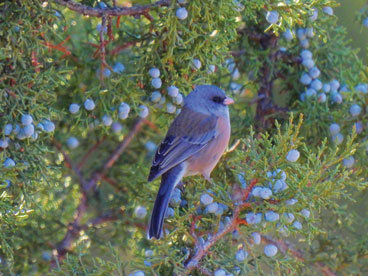
Photo courtesy Charles Martinez
This week’s Bird of the Week, compliments of the Weminuche Audubon Society and Audubon Rockies, is the dark-eyed junco.
Instead of heading off to warmer climates, this colored sparrow shows up in late fall to spend the winter in our fields, parks and yards. Called snowbirds since their arrival at feeders is often followed by snowy weather, their numbers seem largest when winter weather is at its worst. Their feather coats are 30 percent heavier in winter than in summer.
In summer, the dark-eyed junco is one of the most common forest birds in North America, breeding in Alaska, across Canada and in mountainous regions in eastern and western states. Northern populations move south in winter to more open habitats across the United States. In our area they are year-round residents who move from our yards to higher forested elevations in summer.
Dark-eyed juncos are primarily seed eaters, adding insects to their diets during breeding season. They are energetic little birds found hopping on the ground while pecking and scratching for food. In winter they are one of the most common species reported by bird-watchers in Project Feeder Watch. They will feed on platform feeders and on the ground underneath seed feeders, uncovering food that other birds spill.
In winter, juncos band together in large flocks, often with other sparrows and bluebirds. Within the flock, a dominance hierarchy based on age and sex is formed. Banding programs have determined that these birds can live to be 11 years old in the wild.
Dark-eyed juncos all have white outer tail feathers that flash in flight and a pale bill, but several subspecies which differ in plumage coloration are recognized. The ones that we see here are either mostly gray, gray with pink patches or light brown with pink tones and a dark hood.
If you invite birds into your yard with feeders, remember that a source of clean water is essential to birds in all seasons.
For information on events, visit www.weminucheaudubon.org and www.facebook.com/weminucheaudubon/.